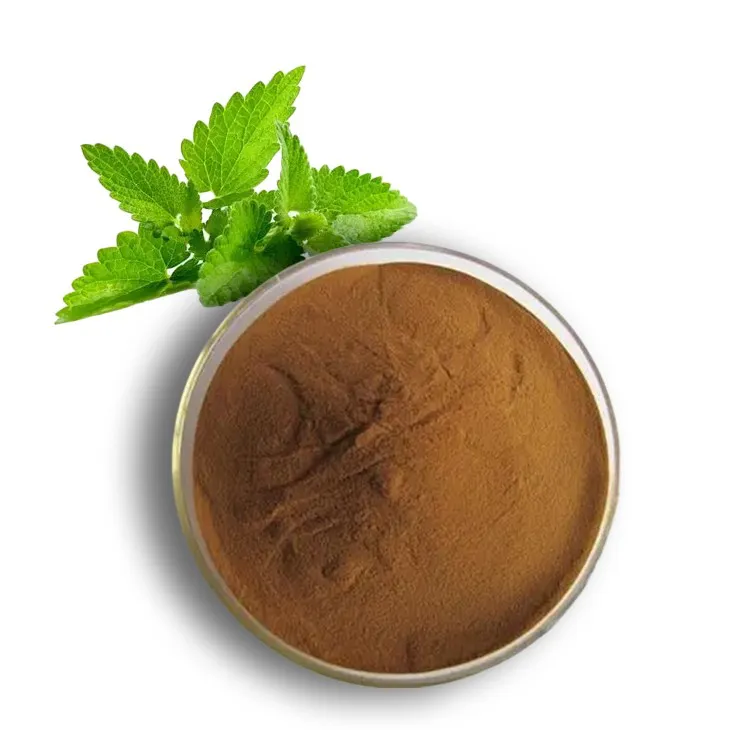- 0086-571-85302990
- sales@greenskybio.com
Is peppermint extract powder beneficial for diabetes? Are these all safe and applicable for diabetic patients?
2024-11-14

1. Introduction
Diabetes is a chronic metabolic disorder that affects millions of people worldwide. Management of diabetes typically involves lifestyle modifications, including diet, exercise, and often medication. In recent years, there has been an increasing interest in exploring the potential benefits of natural substances, such as Peppermint Extract Powder, in diabetes management. Peppermint has been used for centuries in traditional medicine for various purposes. This article aims to comprehensively examine whether Peppermint Extract Powder can be beneficial for diabetes and whether it is safe for diabetic patients.

2. Peppermint Extract Powder: An Overview
Peppermint extract powder is derived from the peppermint plant (Mentha × piperita). It contains a variety of bioactive compounds, including menthol, menthone, and phenolic compounds. These components are responsible for the characteristic flavor and aroma of peppermint, as well as many of its potential health effects.

3. Impact on Blood Sugar Regulation
3.1. Glucose Uptake and Insulin Sensitivity
Some studies suggest that certain compounds in peppermint extract powder may enhance glucose uptake by cells. This could potentially improve blood sugar control in diabetic patients. For example, phenolic compounds in peppermint may act on cellular signaling pathways related to glucose metabolism. By increasing the efficiency of cells to take up glucose from the bloodstream, it can help to lower blood glucose levels. Additionally, there is evidence to indicate that peppermint extract powder may improve insulin sensitivity. Insulin is a hormone that regulates blood sugar, and in diabetes, insulin resistance is a common problem. Compounds in peppermint may help cells respond better to insulin, allowing for more effective glucose regulation.
3.2. Glycemic Index Modulation
Peppermint extract powder may also have an impact on the glycemic index (GI) of foods. The GI is a measure of how quickly a food raises blood sugar levels. Some research has shown that consuming peppermint along with carbohydrates may slow down the digestion and absorption of those carbohydrates, thereby reducing the overall glycemic response. This could be beneficial for diabetic patients as it can help to prevent rapid spikes in blood sugar after meals.

4. Antioxidant Effects
Peppermint extract powder contains antioxidant compounds. Antioxidants play a crucial role in diabetes management as they can help to reduce oxidative stress. In diabetes, high blood sugar levels can lead to increased production of free radicals, which can cause damage to cells, including those in the pancreas (where insulin is produced) and blood vessels. The antioxidant properties of peppermint extract powder can scavenge these free radicals, protecting cells from oxidative damage. This may contribute to better overall health and potentially slow down the progression of diabetes - related complications, such as neuropathy, retinopathy, and cardiovascular diseases.
5. Possible Interactions with Medications
5.1. Oral Hypoglycemic Agents
One of the major concerns when considering the use of peppermint extract powder by diabetic patients is its potential interaction with medications, especially oral hypoglycemic agents. Some studies have suggested that certain compounds in peppermint may enhance the effects of these drugs. While this could potentially lead to better blood sugar control, it also raises the risk of hypoglycemia (low blood sugar). Diabetic patients taking oral hypoglycemic agents need to be cautious when using peppermint extract powder and should closely monitor their blood sugar levels.
5.2. Insulin
Similar to oral hypoglycemic agents, there may be an interaction between peppermint extract powder and insulin. If peppermint extract powder indeed improves insulin sensitivity, it could potentially change the required dose of insulin for diabetic patients. Therefore, patients using insulin should consult their healthcare providers before using peppermint extract powder to ensure the safety and effectiveness of their diabetes management.
6. Safety Considerations for Diabetic Patients
6.1. Allergic Reactions
Some individuals may be allergic to peppermint. Allergic reactions can range from mild symptoms such as skin rashes and itching to more severe manifestations like difficulty breathing and anaphylaxis. Diabetic patients with a known allergy to peppermint should obviously avoid using peppermint extract powder.
6.2. Gastrointestinal Effects
Peppermint can have effects on the gastrointestinal system. While it is often used to relieve digestive problems such as indigestion and bloating, in some cases, it may cause side effects such as heartburn, nausea, or vomiting. Diabetic patients with pre - existing gastrointestinal problems should be cautious when using peppermint extract powder, as these side effects could potentially affect their overall well - being and diabetes management.
7. Conclusion
Peppermint extract powder shows some potential in diabetes management in terms of blood sugar regulation and antioxidant effects. However, there are also potential risks, especially in terms of interactions with medications and safety considerations for individual patients. Diabetic patients who are interested in using peppermint extract powder should consult their healthcare providers first. Healthcare providers can assess each patient's individual situation, including their diabetes control, current medications, and any underlying health conditions, to determine whether peppermint extract powder is a safe and appropriate option for them. Overall, while peppermint extract powder may hold promise as a complementary approach in diabetes management, more research is still needed to fully understand its long - term effects and optimal usage in diabetic patients.
FAQ:
Question 1: How does peppermint extract powder affect blood sugar regulation in diabetic patients?
Peppermint extract powder may have an impact on blood sugar regulation in several ways. Some studies suggest that it can influence certain enzymes involved in carbohydrate metabolism. However, the exact mechanism is not fully understood yet. It might help in moderating the rate at which glucose is absorbed or released in the body, but more research is needed to confirm its definite role in blood sugar control in diabetic patients.
Question 2: What are the antioxidant effects of peppermint extract powder relevant to diabetes?
Peppermint extract powder contains antioxidants. In the context of diabetes, these antioxidants can help reduce oxidative stress. High blood sugar levels in diabetic patients often lead to increased oxidative stress, which can damage cells and tissues. The antioxidants in peppermint extract powder may counteract this by neutralizing free radicals, potentially reducing the risk of some diabetes - related complications.
Question 3: Can peppermint extract powder interact with diabetes medications?
There is a possibility of interaction between peppermint extract powder and diabetes medications. Some substances in peppermint may affect how medications are metabolized in the body. For example, it could potentially interfere with the absorption or efficacy of certain drugs. Diabetic patients should consult their healthcare providers before using peppermint extract powder to ensure there are no adverse interactions with their prescribed medications.
Question 4: How much peppermint extract powder is safe for diabetic patients to consume?
There is currently no standardized recommended dosage of peppermint extract powder specifically for diabetic patients. The safe amount can vary depending on factors such as an individual's overall health, other medications they are taking, and their body's response. It is advisable for diabetic patients to start with a small amount and monitor for any changes in blood sugar levels or side effects.
Question 5: Are there any side effects of peppermint extract powder for diabetic patients?
Some diabetic patients may experience side effects from peppermint extract powder. These can include digestive issues such as heartburn, nausea, or allergic reactions in rare cases. Additionally, if it interacts with medications, it could lead to unexpected effects. Diabetic patients should be vigilant and report any unusual symptoms to their healthcare providers.
Related literature
- The Role of Herbal Extracts in Diabetes Management"
- "Peppermint and its Medicinal Properties: A Review"
- "Antioxidants in Diabetes: Potential Benefits and Sources"
- ▶ Hesperidin
- ▶ citrus bioflavonoids
- ▶ plant extract
- ▶ lycopene
- ▶ Diosmin
- ▶ Grape seed extract
- ▶ Sea buckthorn Juice Powder
- ▶ Beetroot powder
- ▶ Hops Extract
- ▶ Artichoke Extract
- ▶ Reishi mushroom extract
- ▶ Astaxanthin
- ▶ Green Tea Extract
- ▶ Curcumin Extract
- ▶ Horse Chestnut Extract
- ▶ Other Problems
- ▶ Boswellia Serrata Extract
- ▶ Resveratrol Extract
- ▶ Marigold Extract
- ▶ Grape Leaf Extract
- ▶ blog3
- ▶ blog4
- ▶ blog5
-
Organic Tongkat Ali extract powder factory.
2024-11-14
-
How to make powder with ashwagandha extract.
2024-11-14
-
Rosehip extract manufacturers from China.
2024-11-14
-
The best cat's claw extract in nature.
2024-11-14
-
Chinese Dandelion Leaf Extract Suppliers.
2024-11-14
-
Dandelion Leaf Extract
2024-11-14
-
Echinacea Extract
2024-11-14
-
Senna Leaf Extract
2024-11-14
-
Astaxanthin
2024-11-14
-
Alisma Extract
2024-11-14
-
White Peony Extract
2024-11-14
-
Saffron Extract Powder
2024-11-14
-
Golden Seal Extract
2024-11-14
-
Black Pepper Extract
2024-11-14
-
Sea buckthorn Juice Powder
2024-11-14





















